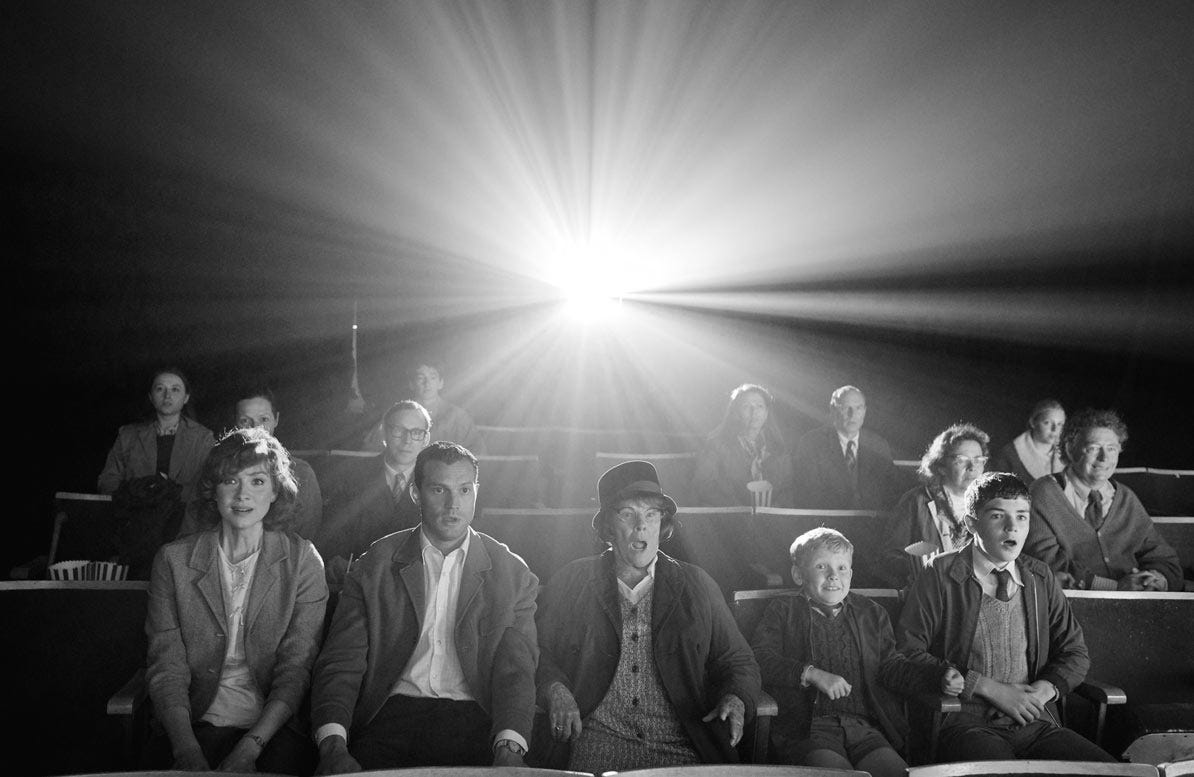"Belfast" Mon Amour, or One of the Sweetest Films of the Year
Branagh leaves brightness behind where darkness and uncertainty stood.
Dear Moviegoers,
Some could draw parallels between Alfonso Cuaron’s Roma and Kenneth Branagh’s Belfast in their scenes of (like the name of this newsletter blog) moviegoing. For Cuaron, going to the cinema in his film is represented as a solemn place not so much for escape but for contemplation. A temporary reprieve, but one that gets under the skin and into the soul. For Branagh, going to the cinema in his film works as both pop enjoyment and long-form possibility. A kid in all of us, eyes wide and smiling from ear to ear, caught up in the excitement of fantasy and what could be. The black and white aesthetic that both movies share holds a tenuous connection, but indeed it’s in the act of watching and feeling that bridges the cultural gap.
With Belfast, I sense another through-line to Roma: A possible Best Picture nomination. The Oscars, as can be argued, shouldn’t be a barometer for quality or relevancy, but maybe for one night, it’s ok for pats on the back.
Telling a story with the Northern Ireland "troubles” of 1969 as a backdrop, the movie is about a young boy nicknamed Buddy who, as a precocious and whip-smart child, is witness to many a dangerous circumstance. At the opening of the film, which begins in modern-day color before transitioning to a black and white past, Buddy and his pals are playing throughout their Belfast neighborhood, where adults look on and admire while going about business. Suddenly, things go deadly quiet, and a mob enters the scene. The camera swirls around Buddy, just as an explosion occurs in front of him. This sequence reminded me a bit of the one in City of God, where the protagonist teen is caught between two gangs, armed only with a camera. Here, Buddy only has his innocence and a choice to make at quite the fork in the road.
Played by a spunky Jude Hill, Buddy eavesdrops on his parents as they discuss what to do, sneaks by local adults as they either worry or exploit, and tries not to cause too much of a ruckus. Hill is the perfect foil for Buddy’s experiences during this time, exhibiting genuine fear and anxiety when warranted, and cutely adorable "aw shucks” moments ala how grown-ups believe their own childhoods were like. Call it a Sandlot or Stand By Me effect, but maybe movies have shown us all how we want to imagine that we were like Buddy at that age. I wasn’t, but he has the right attitude.
Belfast is a delight that knocks down whatever emotional walls have been built up inside, making what must’ve been very personal to the director almost as personal to the viewer. It’s great, and an instant favorite film of the year.
What helps break down the aforementioned walls is most assuredly the strong performance of the ever-concerned and lovingly tough mom of Buddy and his brother, played by Caitriona Balfe. She delivers such passion throughout, and the camera is just so attracted to her magnetism, going long on her takes, capturing every bit of what she’s wearing on her face - stress and all. She’s as intense and real as a parent can be, but never mean or big about anything. There are figurative punches she throws, and sometimes it feels as though the hits are coming from those in front of the screen too. She acts for everyone, and like with her character’s family, she holds everything together.
When Buddy and his family go to see Chitty Chitty Bang Bang at "the pictures,” the single 2D showcase of cars flying off of cliffs, makes them feel as though they’re immersed in IMAX. Or maybe, they’re playing it up for the kids. Or maybe, it’s the woo of the movie. Or maybe it’s all of the above. Maybe for the duration of that time at the theater, they’ve become kids again. They’ve become like Buddy, sitting small in his big seat, looking up at possibilities.
That’s what Belfast was like. That’s what home was like. 5/5



